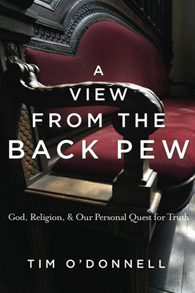 Synopsis:
Synopsis:
Tim O’Donnell grew up in a devoted Roman Catholic home, and was educated in parochial schools. Reading his descriptions about his upbringing is reminiscent of George Carlin’s classic album, Class Clown, in which he detailed his own experiences in a Catholic elementary school. For instance, Carlin recalled a note being sent home from the nuns informing his mother that he was “behind in penmanship.” Carlin joked that he was unable to complete his assignments because he was “crippled” after being thwacked on his hands by ruler-wielding nuns. Remarkably, O’Donnell relates no less than three occasions when he suffered black eyes at the hands of nuns inflicting corporal punishment!
Still, O’Donnell, who also attended a Catholic high school and college, says that his favorite subject was religion and, like Carlin, he asked more questions than the nuns and priests could answer. Frequently told to quit asking questions and simply accept the information they were providing him as a matter of faith brings to mind the response Carlin said he most often received in response to his inquiries: “Well, it’s a mystery.”
Carlin eventually turned not only away from the church, but away from God, spending much of his adult life as a raging atheist. O’Donnell, unlike Carlin, never lost his faith, but also never stopped asking questions about the information he received from his church. He enjoyed a successful career in business, a portion of it — not surprisingly — as a reporter, and when he reached a point in his life when he could afford to take a sabbatical, he did just that, devoting himself entirely to reading, studying, meditating, and searching for answers to the questions that had plagued him for so long. He was on a quest to find out which was true, his “religious conditioning or [his] spiritual intuition.”
The result is A View from the Back Pew, in which O’Donnell recounts some of the most important events in his life as they relate to his efforts to balance “the dogma of Catholicism and a hunch about a more accessible spiritual presence in [his] life.” To his credit, O’Donnell writes humbly and without pretense, staking no claim to theological or philosophical expertise. Rather, A View from the Back Pew is the story of his personal journey from “ritualistic systems of belief to a more vital connection with the intelligence that animates the universe, the essence that we are trained to call God.”
Review:

O’Donnell leads readers through fourteen chapters in which he considers various topics such as those pesky “mysteries of faith,” what religion, Christianity, the Trinity, Jesus, and the clergy are — and are not — and what he calls “The Deal.” He relates the story of his trip to Rome to study. He went into the Scavi (“excavations”) beneath St. Peter’s Basilica and experienced a “rush of recognition” that Apostolic Succession is the truth. In other words, he became convinced that when Jesus told Peter “you are the rock,” he established a direct link from himself to the church. Thus, O’Donnell determined to continue educating himself about Catholicism. Shortly after that revelation, while still in Rome, O’Donnell was reading the book of John. He felt “an incredible and unexplainable sense of oneness,” an understanding that God existed within him. He also felt a strong call to study theology with a new perspective and approach, confident that he would have the financial security to do so. Yet, looking back, he notes that he inexplicably missed the “obvious disconnect” between his experience in the Scavi and The Deal. “One affirmed the Church’s direct ink to Jesus and the other rejected religious institutions in favor of spiritual experience.” But his quest for knowledge was far from concluded.
Religion and spirituality are not the same thing. They may or may not be mutually exclusive. Some people may find spirituality in the dogma of formal religion — I do not.~ Author Tim O’Donnell
Back from Rome, O’Donnell dropped out of college and entered the business world. He recounts many of the lessons he learned over the years, including how his perspective on women matured. He reached the correct conclusion that the church’s treatment of women is archaic and repugnant, recognizing, as a result of his studies, that Jesus was, in fact, an egalitarian and — dare I say it? — feminist. He learned that The Deal “was real” and achieved enormous success that allowed him the luxury of seven years in “Walden Woods,” reaching the point where he could write A View from the Back Pew in order to share with readers the spiritual truths that he knows “at this time in [his] life.” His knowledge base now includes his recognition that he entered into The Deal “with something much larger than the institutional Catholic Church. It just took me 20 years to figure out what.” And he is now able to connect to God “sans dogma.” Perhaps most importantly, questions “have become the cornerstone” of his spiritual practice — he will continue asking questions for the rest of his life.
O’Donnell writes in an easily understood, conversational style. His eagerness to share what he has learned is palpable and evident. He lays out the series of questions/issues he plans to explore early in each chapter, usually after an introductory explanation and recollection of a specific time in his life when he was focused on the chapter’s topic, and then details the answers he has discovered to date. O’Donnell’s approach makes each chapter a stand-alone resource, but to see his full spiritual transformation, the book must be read from beginning to end.
I admit that O’Donnell’s reflections about growing up in the Roman Catholic Church are interesting, but since I have never been a member of that church, I cannot relate to his frustrations. For instance, his shared experience with George Carlin of being shut down by priests and nuns who simply could not provide an answer to his queries is both humorous and tragic, but not something I encountered — I was raised in the Evangelical Lutheran Church in America (and its predecessor, the American Lutheran Church). But O’Donnell’s sense of disconnection between his church and its dogma, and a personal relationship with the Triune God, will evoke empathy from readers who, like O’Donnell, spent years sitting in church on Sunday morning wondering what relevance the weekly worship service had to their everyday lives.
O’Donnell correctly considers A View from the Back Pew an introductory work for believers who are just embarking upon their own journey to greater oneness with God. It is an excellent primer from which to graduate into a detailed study of Scripture or, perhaps, reading of more scholarly theological treatises. O’Donnell’s experiences are interesting and his perspective entertaining, with plenty of “me, too” moments even for Protestant readers such as myself. Readers should be aware that O’Donnell is a man of faith, and it is from the faithful perspective of a believer that O’Donnell approaches his subject matter. And while it is unlikely that readers whose connections to and histories with denominations that place greater emphasis upon a personal relationship with God than does the Roman Catholic church will find O’Donnell’s realizations startling or novel, there are still many aspects of O’Donnell’s transformative journey to which those readers will relate, making A View from the Back Pew an enjoyable read.



4 Comments
[New Post] Book Review: A View from the Back Pew https://www.jhsiess.com/2011/03/02/book-r…
Thank you for such a thorough and insightful review. We really appreciate you being on the tour!
Hi Janie,
I too had the pleasure of reading this book and share a lot of your views about it. It was a great book to read and I enjoyed reading your review as well. It is nice to hear what other people think, as we each have our personal biases towards any subject matter.
Pingback: Tim O’Donnell, author of A View from the Back Pew, on tour March 2011 | TLC Book Tours